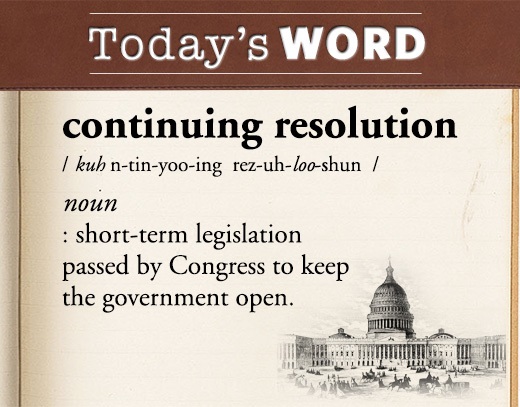The Pass of Laws by Congress is This Continuing Resolution

This week, Congress passed and President Obama signed something called a Continuing Resolution, an important measure that ensures our government has the resources necessary to address key domestic and national security goals in the months ahead, including our strategy to degrade and destroy ISIL, and to continue normal government operations without disruption.
The President thanked Congress for their quick action in supporting our efforts: "I believe that we're strongest as a nation when the President and Congress work together. And I thank leaders in Congress for the speed and seriousness with which they approached this urgent issue -- in keeping with the bipartisanship that is the hallmark of American foreign policy at its best."
But what exactly is a Continuing Resolution and what does this one include? Here's a few answers to some key questions that many Americans may be asking:
Q: So what is a Continuing Resolution?
In our government, the legislative branch holds the power of the purse, which means Congress is responsible for passing legislation to fund the government. From funding our national defense to investing in job training and public infrastructure to maintaining government operations, Congress decides how to appropriate taxpayer dollars each fiscal year.
However, if Congress fails to pass legislation to fund the government before a new fiscal year begins, they can pass legislation to keep federal operations going at the current spending levels. That legislation is called a Continuing Resolution (CR).
Q: Do we need a Continuing Resolution right now?
Yup. The new fiscal year (FY 2015) begins on October 1. Because Congress has yet to pass any bills to fund government operations, they had to pass a Continuing Resolution to keep the federal government open for business. This short-term measure expires on December 11.
Q: What would happen if they didn't pass it?
The government would shut down, like it did right around this time last year. In 2013, the government shut down for 16 days – forcing employees to be furloughed, national parks to close, childcare and other services for military families to shutter, and loans to small businesses to stall. In fact, the last government shutdown cost our government billions of dollars in lost productivity and revenue.
Q: Yikes. Did Congress pass a Continuing Resolution this time?
Yes. This week, the House and the Senate passed a CR that funds the government based on FY 2014 appropriations levels.
Q: So what's in it?
That's an important question. The CR basically continues to fund everything we've been funding in the last year. However, President Obama asked Congress to include key provisions that are necessary to address our nation's top security priorities. Here are the important issues that the CR addresses:
- ISIL: Congress attached an amendment to the CR that provides the authority to train and equip moderate Syrian opposition forces in the fight against the terrorist organization ISIL. The U.S. has already executed more than 170 targeted airstrikes and bolstered our assistance to the Syrian opposition. The CR authorizes the U.S. military to provide training and equipment to strengthen their forces and help them take on ISIL terrorists inside Syria. However, this effort will not involve American troops in Syria.
- EBOLA: The President is devoting significant resources to help combat the Ebola epidemic in West Africa with the goals of controlling the outbreak, addressing its destabilizing effects on local communities, coordinating a global response, and building up a public health system in the affected countries so they can better meet a situation like this in the future. The CR includes $30 million for the Centers for Disease Control and Prevention (CDC) and $58 million for the Biomedical Advanced Research and Development Authority to help accomplish these goals and respond to the Ebola outbreak.
- UKRAINE: President Obama has made clear that the United States will continue to support a free, independent Ukraine. The U.S. has been working with international partners to level sanctions against Russia and provide much-needed humanitarian aid to the Ukrainian people. The CR includes a provision that provides flexibility to ensure that the Department of State and USAID can respond to events as they happen in Ukraine.
Along with these security priorities, the CR also extends the charter of the U.S. Export-Import Bank, an organization that creates American jobs by helping to take American businesses global. The Bank's charter was set to expire on October 1, 2014, but the CR has renewed its charter through June 30, 2015.
While the short-term extension protects thousands of businesses -- large and small -- from taking an unnecessary financial hit, a long-term renewal would be the best way to provide much-needed certainty to job-creators that export American-made products and services.
Q: But this is not a budget for the whole year?
No, it's not. It's a temporary funding measure that will last until December 11. At that point, Congress will try again to reach a budget agreement that will fund the government for the remainder of FY2015.
Q: Does the President have a say in what goes into the federal budget?
Yes he does! President Obama submitted a budget to Congress that provides a roadmap for accelerating economic growth, expanding opportunity for all Americans, and ensuring fiscal responsibility. His budget shows the choices he would make within the spending levels that Congress agreed to in the Bipartisan Budget Act.
Want to dive into the specifics of how the President would strengthen our economy and continue to bring down the deficit? Watch Brian Deese, Deputy Director of the Office of Management and Budget, break down the budget -- then share it with everyone who should see it:
Watch on YouTube
Source: https://obamawhitehouse.archives.gov/blog/2014/09/19/what-s-continuing-resolution-and-why-does-it-matter
0 Response to "The Pass of Laws by Congress is This Continuing Resolution"
Post a Comment